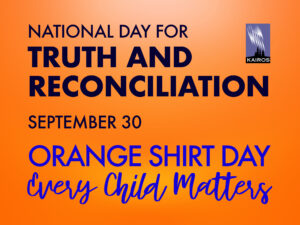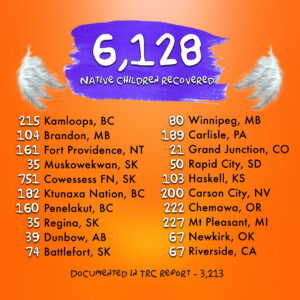Spirited Reflection: Orange Shirt Day and National Day for Truth and Reconciliation

A growing, Indigenous-led, grassroots movement has claimed September 30 as Orange Shirt Day – a day to remember and honour the students of Residential Schools – since 2013. This year the federal government has responded to TRC Call to Action 80 and named September 30 to also be the National Day for Truth and Reconciliation.
On September 30, wear orange and set aside some time to take your next step on a reconciliation journey. We offer this prayer, reflection and a collection of resources from our members to help you on your way.
A prayer
Everything Indigenous people do is in a circle. Since the power of nature works in a circle, to be one with all that is, we too must work in a circle.
In the old days all our power came from the Sacred Hoop of the nation and as long as the hoop was unbroken the people were strong.
The Great Spirit gave life in a circle, from childhood to childhood. Our children are there to teach us and for us to teach them. Our children were taken out of our Sacred Hoop and our hoop has been broken.
For decades we mourned the loss of our children. They never completely returned home.
We asked the Great Spirit to help us repair our Sacred Hoop and bring our children home. We know that Mother Earth kept them close to her and kept them safe all these years. We now ask you, Great Spirit to take them home with you and repair our Sacred Hoop.
Truth and reconciliation: A reflection by Connor Sarazin
What is the meaning behind Truth and Reconciliation? It is all about discovering and revealing governments’ past wrongdoings. With the truth revealed, repairing and establishing a respectful relationship between Indigenous and non-Indigenous peoples in Canada can move forward.
The legacy of the Indian Residential Schools lives on for Indigenous Peoples. In 1870, the Canadian government partnered with numerous churches to assimilate, civilize and make everyone live a European lifestyle. For the First Nations people, this meant giving up their traditions, beliefs, and complete way of life that didn’t align with the new settlers.
Many people say that it wasn’t them, their children or their parents who were responsible for the Residential Schools so why are they being made to feel guilty about it? I believe the point is being completely missed. It isn’t about blame or guilt it is all about shedding light on the truth. The truth of what the Canadian government in partnership with the churches did to an entire nation of people. It is education for newcomers and settlers alike. So they can better understand and empathize with a group of people who struggled for generations, and continue to struggle, to simply be who they are, find their true selves and the balance between living true to the authentic traditions of their culture and living in today’s society.
So many people are completely unaware of what happened. Unaware that these so-called schools only taught up to grade 5. It was claimed that the practical training of cleaning, farming and maintenance gave necessary life skills but in actuality it was simply free child labour. Many children, once they turned 18 were merely sent away from the school with a grade 5 education.
There is a lasting impact from my great grandparents and grandparents who attended residential schools. My grandparents fled their home, the safety of their community and all that was familiar to save their children from being forcefully taken. To save their children from the atrocities of the abuse, violence and neglect they themselves endured, they lived their lives hidden from society. Little did my grandparents know, all they sacrificed wouldn’t be enough to save their own children. The shame of being “Indian”, the abuse they would inflict on their own children for being who they are, the substance abuse, emotional, mental and physical abuse would be carried on from their children, grandchildren, great grandchildren and great, great grandchildren. The legacy of the Residential Schools lives on and is thriving to this day.
It wasn’t until 1960 that “Indians” were recognized under Canadian Law as people. My dad was in his late teens. I don’t imagine life was easy growing up in the ‘40s and ‘50s. I couldn’t imagine growing up knowing that the world I live in doesn’t recognize me as even being a person. For my grandfather, I can only imagine what his thoughts were being called to serve during World War II knowing he was not recognized as a person to the people he fought for.
Some days I wonder if the world has really changed all that much. I don’t hear “The only good Indian is a dead one!” as I did growing up. The comments are said more under breath now. Yet our health care system is mandated to notify Social Services if an Indigenous woman is there to give birth. The threat remains as real for our children to be removed now as when they were placed in Residential Schools. There are more Indigenous children removed from their homes and placed in the system today, than at the height of the Residential Schools.
How can we reconcile if you deem me to be less-than because of my nationality? Why do you perceive me to be less competent, less educated and less deserving to have all that life has to offer simply because I am First Nations?
The ‘truth’ in “Truth and Reconciliation” to me, really means that I can stand up in front of the settlers and newcomers and decide what is best for me. It is not for you to remove my choice and decide as the government does, what is best for the Indigenous people. Everything that the Residential Schools took from generations of my people stripped them of their culture, way of living and in a lot of cases their dignity. They never managed to “kill the Indian” inside. We are a resilient people and are asking that you stand aside and support our efforts to regain who we once were as a nation. Hold a mirror up and take a good look at who you are and ask yourself, “How am I contributing to the problem instead of being a part of the solution?”
The ‘truth’ in Truth and Reconciliation” is there for all of us to be aware of our truth and the truth of others. Stop allowing the systems that hold the Indigenous people down and keep them there. Stand beside or behind the Indigenous people to support the recovery of all they have lost: spiritually, mentally, emotionally and physically. Stop standing in front and saying “I am sick of hearing about this, why don’t they get over it already, I had nothing to do with it?” You are a part of the problem.
The Indigenous people are asking for equity and respect. To be an equal doesn’t mean you have to lose something. This is a Canadian issue. Take responsibility and action to repair the damage done. “Truth and Reconciliation” is Indigenous and non-Indigenous peoples walking together towards an equitable, fair and just country that we all can be proud to call home.

Connor Sarazin is a citizen of The Algonquins of Pikwàkanagàn First Nation, and has roots that run deep in the Algonquin unceded traditional territory. Raised in Northern Ontario, Connor learned to live on and respect the land and all of its inhabitants. Growing up, Connor had to go away to attend school and lived with a number of non-Indigenous families and quickly learned to navigate both worlds while trying to maintain and learn more traditional ways.
RESOURCES FOR SEPTEMBER 30 AND BEYOND
Anglican Church of Canada
Every Child Matters: Grace Will Lead Them Home
For September 30, the National Day for Truth and Reconciliation—Orange Shirt Day—the Anglican Church of Canada has produced Every Child Matters: Grace Will Lead Them Home, a video service of reflection and prayer. This service was designed by a group of Indigenous Anglican Elders.
Canadian Friends Service Committee (Quakers)
Social media encourages recognition of the first National Day for Truth and Reconciliation.
A video project where Indigenous partners sharing answers to common questions about reconciliation
Truth and Reconciliation: Quakers in Action
A guide to help Friends and others engage with the TRC’s Calls to Action
Truth and Reconciliation: A Guide for Canadian Quakers
Developed at the close of the TRC, this guide holds many resources that continue to be relevant today.
We are also active members of the Coalition for the Human Rights of Indigenous Peoples, which has many other relevant resources.
Canadian Religious Conference (CRC)
Launch of inaugural Truth and Reconciliation Week
An article that explains five days of Truth and Reconciliation focus based on the work of the National Centre for Truth and Reconciliation.
Other news of note:
Statement of Apology by the Catholic Bishops of Canada to the Indigenous Peoples of This Land
Christian Reformed Church (CRCNA)
The CRC’s Canadian Indigenous Ministry has released a guided reflection through the Do Justice podcast for September 30. It is designed to be a personal reflection including listening to some of the TRC Calls to Action. We encourage people, where they can, to walk as they listen in their local communities.
Praying Through the Truth and Reconciliation Calls to Action #71-76.
Indigenous Family Centre Director Shannon Perez and Pastor Jacqui Mignault bring you this prayer reflecting on the Truth and Reconciliation Commission’s Calls to Action #71-76, addressing the deaths of Indigenous children at residential schools.
Evangelical Lutheran Church in Canada
In a letter to the church, Evangelical Lutheran Church in Canada (ELCIC) National Bishop Susan Johnson encourages members to observe Thursday, September 30 as Orange Shirt Day, National Day for Truth and Reconciliation.
Jesuit Forum
Listening to Indigenous Voices: A Dialogue Guide on Justice and Right Relationships
Listening to Indigenous Voices explores Indigenous worldviews, examines the history of colonization, and concludes with sessions on righting relationships, decolonization, and indigenization. Each session includes questions to guide sharing circles as well as curriculum ideas for use in secondary and post-secondary educational settings.
Presbyterian Church in Canada
Every Child Matters: A Video from Vivian Ketchum for Orange Shirt Day
Vivian Ketchum, originating from Wauzhushk Onigum Nation of Northern Ontario, and a member of Place of Hope Presbyterian Church in Winnipeg, Man., talks about why she wears an orange shirt, and why it is important for members of the church to mark September 30.
Social Action Hub – Indigenous Justice
This page contains information, resources, advocacy tools and study guides about justice for Indigenous peoples.
The Primate’s World Relief and Development Fund (PWRDF)
PWRDF’s Mapping the Ground We Stand On (Mapping Exercise), is an interactive educational resource developed in response to the 2015 Truth and Reconciliation Commission’s 94 Calls to Action. The workshop offers Indigenous and settler participants opportunity to explore their historic and current place on the map of Canada and their relationship to one another. The workshop experience enables participants to imagine what personal and collective journeys toward a just, respectful and healing relationship might look like. Mapping Exercise facilitators are available to offer the workshop in both in-person and online formats.
The United Church of Canada
Honour Children Who Attended Residential Schools
A page of events, links and actions for the week of September 30.
